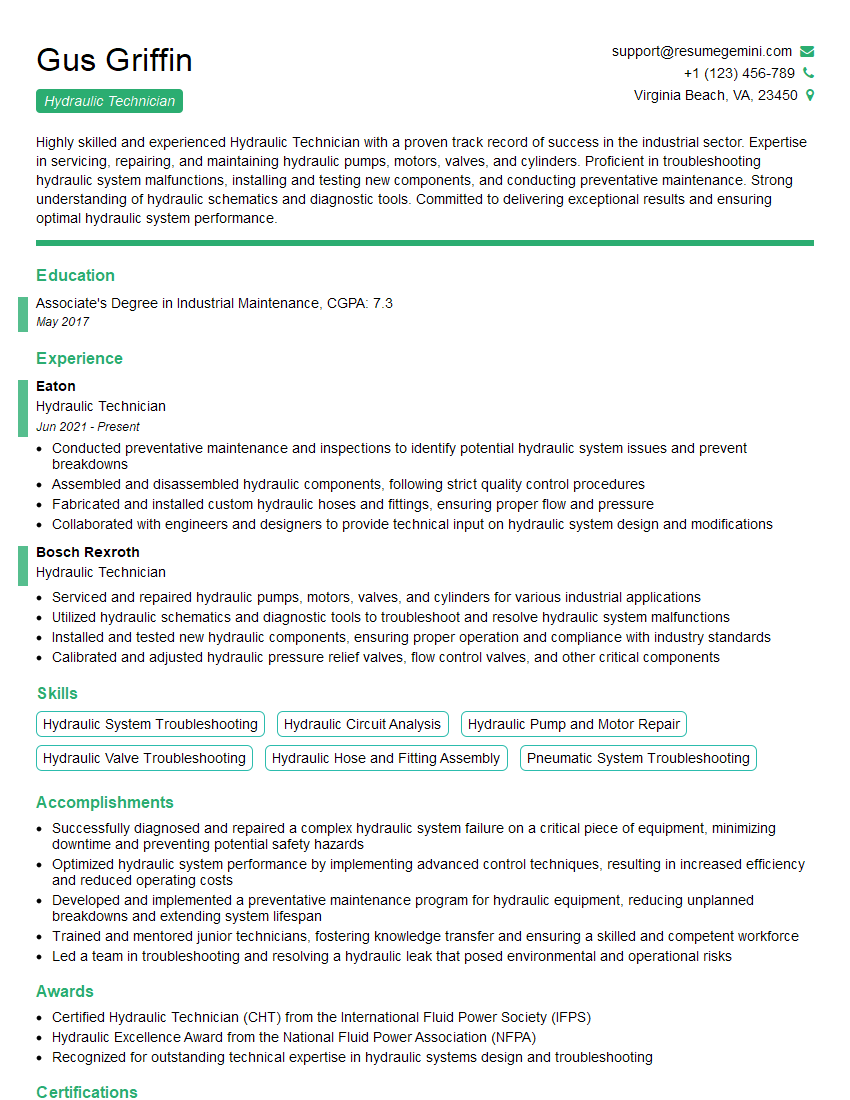Are you a seasoned Hydraulic Technician seeking a new career path? Discover our professionally built Hydraulic Technician Resume Template. This time-saving tool provides a solid foundation for your job search. Simply click “Edit Resume” to customize it with your unique experiences and achievements. Customize fonts and colors to match your personal style and increase your chances of landing your dream job. Explore more Resume Templates for additional options.

Gus Griffin
Hydraulic Technician
Summary
Highly skilled and experienced Hydraulic Technician with a proven track record of success in the industrial sector. Expertise in servicing, repairing, and maintaining hydraulic pumps, motors, valves, and cylinders. Proficient in troubleshooting hydraulic system malfunctions, installing and testing new components, and conducting preventative maintenance. Strong understanding of hydraulic schematics and diagnostic tools. Committed to delivering exceptional results and ensuring optimal hydraulic system performance.
Education
Associate’s Degree in Industrial Maintenance
May 2017
Skills
- Hydraulic System Troubleshooting
- Hydraulic Circuit Analysis
- Hydraulic Pump and Motor Repair
- Hydraulic Valve Troubleshooting
- Hydraulic Hose and Fitting Assembly
- Pneumatic System Troubleshooting
Work Experience
Hydraulic Technician
- Conducted preventative maintenance and inspections to identify potential hydraulic system issues and prevent breakdowns
- Assembled and disassembled hydraulic components, following strict quality control procedures
- Fabricated and installed custom hydraulic hoses and fittings, ensuring proper flow and pressure
- Collaborated with engineers and designers to provide technical input on hydraulic system design and modifications
Hydraulic Technician
- Serviced and repaired hydraulic pumps, motors, valves, and cylinders for various industrial applications
- Utilized hydraulic schematics and diagnostic tools to troubleshoot and resolve hydraulic system malfunctions
- Installed and tested new hydraulic components, ensuring proper operation and compliance with industry standards
- Calibrated and adjusted hydraulic pressure relief valves, flow control valves, and other critical components
Accomplishments
- Successfully diagnosed and repaired a complex hydraulic system failure on a critical piece of equipment, minimizing downtime and preventing potential safety hazards
- Optimized hydraulic system performance by implementing advanced control techniques, resulting in increased efficiency and reduced operating costs
- Developed and implemented a preventative maintenance program for hydraulic equipment, reducing unplanned breakdowns and extending system lifespan
- Trained and mentored junior technicians, fostering knowledge transfer and ensuring a skilled and competent workforce
- Led a team in troubleshooting and resolving a hydraulic leak that posed environmental and operational risks
Awards
- Certified Hydraulic Technician (CHT) from the International Fluid Power Society (IFPS)
- Hydraulic Excellence Award from the National Fluid Power Association (NFPA)
- Recognized for outstanding technical expertise in hydraulic systems design and troubleshooting
Certificates
- Certified Fluid Power Technician (CFPT)
- Certified Hydraulic Technician (CHT)
- Certified Pneumatic Technician (CPT)
- Certified Maintenance and Reliability Technician (CMRT)
Career Expert Tips:
- Select the ideal resume template to showcase your professional experience effectively.
- Master the art of resume writing to highlight your unique qualifications and achievements.
- Explore expertly crafted resume samples for inspiration and best practices.
- Build your best resume for free this new year with ResumeGemini. Enjoy exclusive discounts on ATS optimized resume templates.
How To Write Resume For Hydraulic Technician
- Highlight your specific skills and experience in hydraulic maintenance and repair.
- Quantify your accomplishments whenever possible, using specific metrics to demonstrate your impact.
- Showcase your knowledge of hydraulic principles, troubleshooting techniques, and industry best practices.
- Emphasize your commitment to safety and quality assurance in all aspects of your work.
Essential Experience Highlights for a Strong Hydraulic Technician Resume
- Diagnose and resolve hydraulic system malfunctions using hydraulic schematics and diagnostic tools.
- Install and test new hydraulic components, ensuring proper operation and compliance with industry standards.
- Calibrate and adjust hydraulic pressure relief valves, flow control valves, and other critical components.
- Conduct preventative maintenance and inspections to identify potential hydraulic system issues and prevent breakdowns.
- Assemble and disassemble hydraulic components, following strict quality control procedures.
- Fabricate and install custom hydraulic hoses and fittings, ensuring proper flow and pressure.
- Collaborate with engineers and designers to provide technical input on hydraulic system design and modifications.
Frequently Asked Questions (FAQ’s) For Hydraulic Technician
What are the key skills required to be a successful Hydraulic Technician?
Key skills for a Hydraulic Technician include troubleshooting hydraulic system malfunctions, installing and testing hydraulic components, calibrating and adjusting hydraulic valves, conducting preventative maintenance, assembling and disassembling hydraulic components, fabricating and installing hydraulic hoses and fittings, and collaborating with engineers and designers.
What are the career prospects for Hydraulic Technicians?
Hydraulic Technicians are in high demand across various industries, including manufacturing, construction, and energy. With experience and specialized skills, they can advance to supervisory or managerial roles or pursue careers in hydraulic system design and engineering.
What is the average salary range for Hydraulic Technicians?
The average salary range for Hydraulic Technicians varies depending on experience, location, and industry. According to Indeed, the national average salary for Hydraulic Technicians in the United States is around $65,000 per year.
What are the educational requirements to become a Hydraulic Technician?
While formal education is not always required, many Hydraulic Technicians hold an associate’s degree in Industrial Maintenance, Mechanical Engineering Technology, or a related field. Relevant certifications and hands-on experience are also valuable.
What are the growth opportunities for Hydraulic Technicians?
With the increasing use of hydraulic systems in various industries, the demand for skilled Hydraulic Technicians is expected to grow in the coming years. Experienced technicians can pursue advanced certifications, specialize in specific areas, or move into management or engineering roles.
What industries employ Hydraulic Technicians?
Hydraulic Technicians find employment in a wide range of industries that utilize hydraulic systems, including manufacturing, construction, mining, agriculture, transportation, and energy.